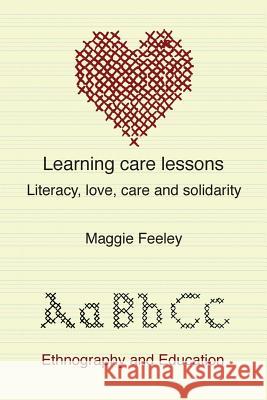Learning Care Lessons: Literacy, Love, Care And Solidarity » książka
Learning Care Lessons: Literacy, Love, Care And Solidarity
ISBN-13: 9781872767987 / Angielski / Miękka / 2014 / 198 str.
Despite ongoing debates, funding and pedagogical initiatives, why do many children and adults continue to miss out on learning literacy? Might it be that we have given too little attention to a vital determinant in the learning process? This book introduces the concept of learning care - the emotional and affective attitudes and actions at home, school and in wider society, that support and encourage learning. An ethnographic exploration of learning care carried out with adult survivors of institutional abuses in the now notorious Irish industrial schools highlights the pivotal importance of care through their retelling of care-less childhood memories. The book argues for the notion of learning care to be given serious consideration and for the state to fulfill its learning care duty to equally resource families, schools and communities to do this pivotal work. Learning care abuses are not confined to Ireland or indeed to the past. Across continents, similar cases of institutionalised educational injustice have emerged, perpetrated against aboriginal, poor and misrecognised minorities. Today, perhaps with less obvious savagery, such disregard persists in learning inequalities rooted in self-replicating systems of privilege, that cherish the potential of some, whilst wasting that of others. We are all diminished by this neglected potential. Maggie Feeley documents the profoundly relational dynamics of learning, literacy and love and how the absence of care links with wider structures of inequality. This is ethnography at its best - reflexive; care-full; power-aware, not avoidant; data rich, theory driven, and justice inspired. Professor Wendy Luttrell This is an exemplary study of how to work effectively in low-trust environments. It describes how to build relationships of trust within research settings so that painful truths can be told and understood in a collective perspective that enables all participants to move beyond a traumatic past. Professor Mary Hamilton
Despite ongoing debates, funding and pedagogical initiatives, why do many children and adults continue to miss out on learning literacy? Might it be that we have given too little attention to a vital determinant in the learning process? This book introduces the concept of learning care - the emotional and affective attitudes and actions at home, school and in wider society, that support and encourage learning. An ethnographic exploration of learning care carried out with adult survivors of institutional abuses in the now notorious Irish industrial schools highlights the pivotal importance of care through their retelling of care-less childhood memories. The book argues for the notion of learning care to be given serious consideration and for the state to fulfill its learning care duty to equally resource families, schools and communities to do this pivotal work.Learning care abuses are not confined to Ireland or indeed to the past. Across continents, similar cases of institutionalised educational injustice have emerged, perpetrated against aboriginal, poor and misrecognised minorities. Today, perhaps with less obvious savagery, such disregard persists in learning inequalities rooted in self-replicating systems of privilege, that cherish the potential of some, whilst wasting that of others. We are all diminished by this neglected potential.Maggie Feeley documents the profoundly relational dynamics of learning, literacy and love and how the absence of care links with wider structures of inequality. This is ethnography at its best - reflexive; care-full; power-aware, not avoidant; data rich, theory driven, and justice inspired. Professor Wendy LuttrellThis is an exemplary study of how to work effectively in low-trust environments. It describes how to build relationships of trust within research settings so that painful truths can be told and understood in a collective perspective that enables all participants to move beyond a traumatic past. Professor Mary Hamilton











